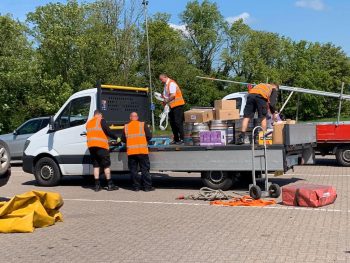Construction firms ‘hugely vulnerable on van safety’, National Highways warns
Construction firms are putting companies, drivers and other road users at risk by not carrying out effective risk management on vans and their drivers.

The most common issues unearthed in the spot checks were insecure loads, broken lights, tyre failures, fuel leaks and missing mirrors, and unlicensed drivers
The warning comes from National Highways, which is teaming up with the Driver and Vehicle Services Agency (DVSA) in October on specific enforcement activity to clamp down on safety issues within this sector.
An investigation by National Highways has revealed that while the construction sector has made huge strides in terms of site safety and HGV fleet management, vans are the sector’s ‘Achilles heel’.
Spot checks carried out by the organisation at key sites earlier this year showed a 40% prohibition rate among vans – of which there are an estimated one million on UK roads belonging to the construction or civil engineering sectors.
The most common issues unearthed in the spot checks were insecure loads, broken lights, tyre failures, fuel leaks and missing mirrors, and unlicensed drivers.
Head of commercial vehicles Mark Cartwright said: “The worrying aspect of these prohibitions is not just the illegality of the vehicles, but that they obviously had not been checked prior to use.”
The investigation also showed many drivers were ignorant of the law and didn’t have valid licences, or were driving vehicles they weren’t qualified for – suggesting broader systemic and management failings.
“It should concern board members, managers and drivers that in the event of a collision, the lack of a valid licence is not only illegal but will probably invalidate the company’s insurance,” added Cartwright.
UK road casualty data shows that vans have the highest rate of ‘other road user’ deaths per mile and also that van drivers themselves are at risk. For every 100 crashes in 2019, three of the fatalities were van drivers, with 43 losing their lives that year.
“Driving is the single most dangerous activity these workers undertake in their day – and they do not realise that risk or how to mitigate it,” said Cartwright.
“We know that the construction and civil engineering sectors are capable of rising to this challenge because they have transformed safety on sites and in relation to HGVs,” he added. “We now need them to step up and educate all construction workers and put proper fleet safety management protocols in place.”
He added that using the power of procurement could ensure safety for all parties.
“For smaller contractors, evidence of safety regimes helps you win work, and for larger companies safety protocols should be an essential component of contractor choice.”
Cartwright also warned that there needed to be a reconnect between company management and transport activities.
Core areas that need to be addressed include ensuring drivers are licensed and trained for use on the vehicles they are driving and making sure proper policies are deployed, such as daily walk round checks. Safety policies also need to be extended to drivers’ own vehicles.
Companies should also be aware that if a worker causes a fatality on the road which can be linked to a lack of occupational educational or proper governance, management can be prosecuted under corporate manslaughter and Health & Safety legislation.
Construction firms can also make use of a free van driver toolkit launched earlier this year by the Highways England Commercial Vehicle Incident Prevention Team as part of the Driving for Better Business programme to ensure van fleets are safe, legal and cost-effective.
The toolkit features more than 30 free online modules for van driver training, and can be accessed by fleet operators and anyone who employs van drivers in their business, and shared either online, via email or as printed cards. To access the toolkit, click here.

















